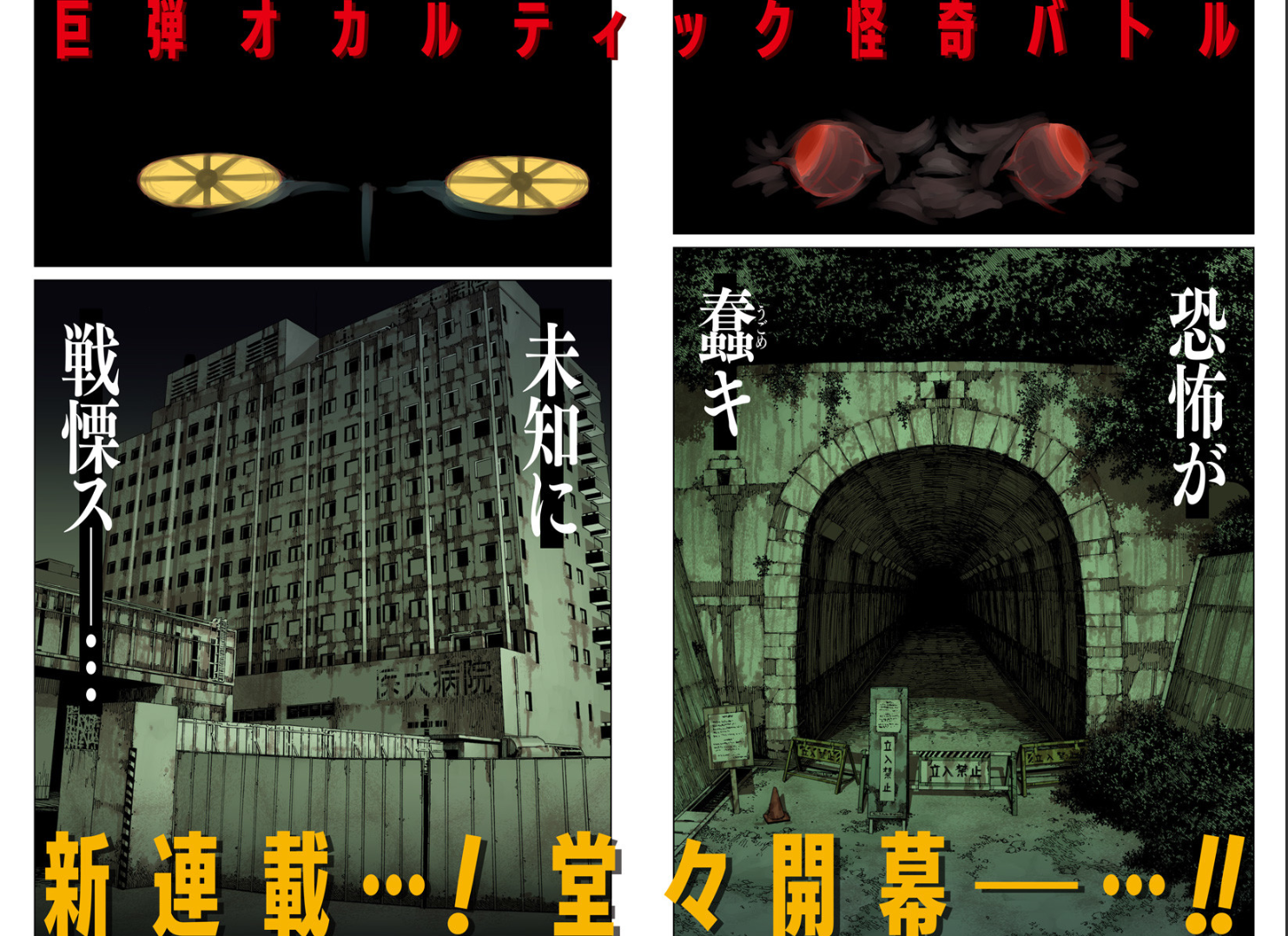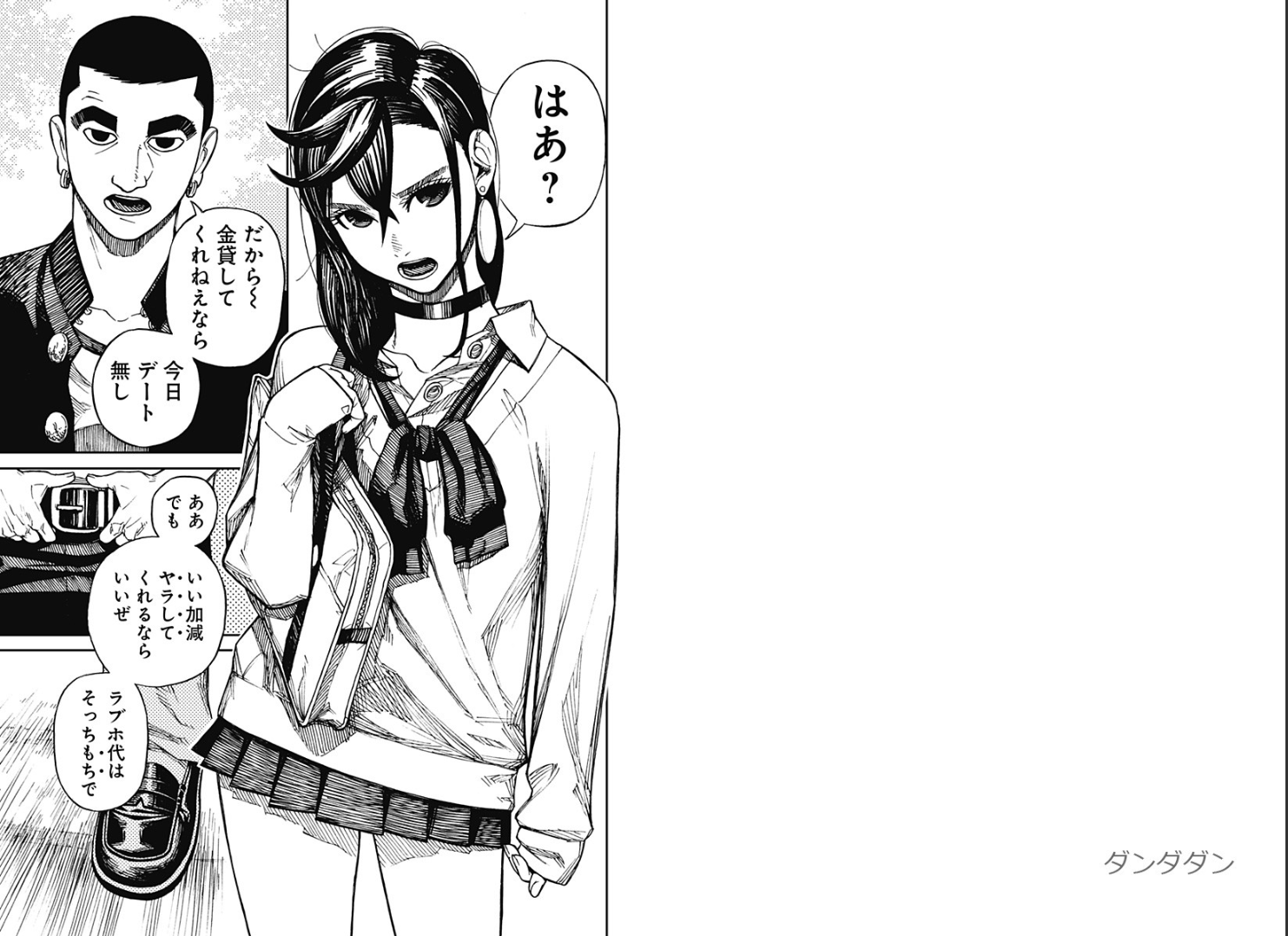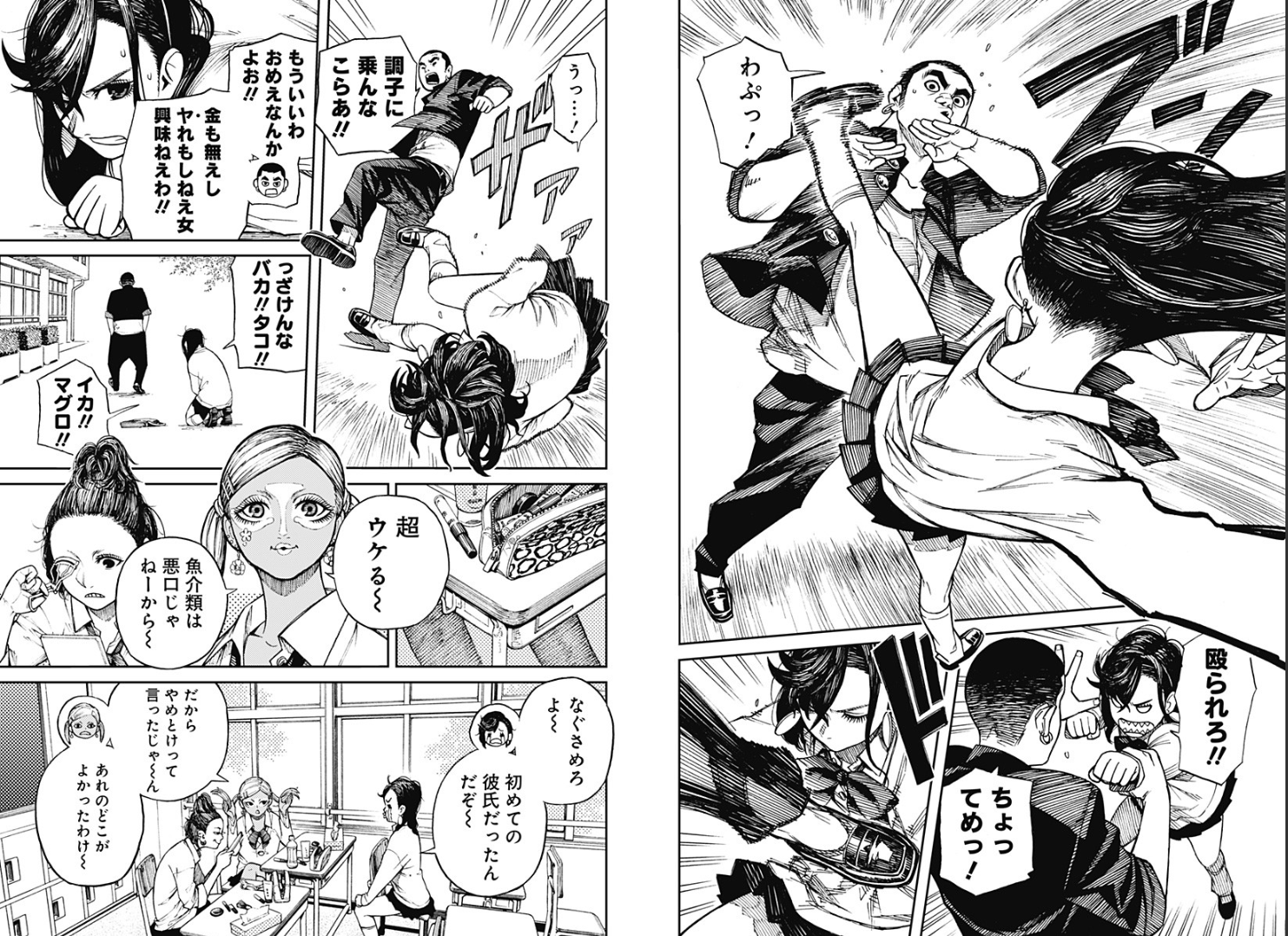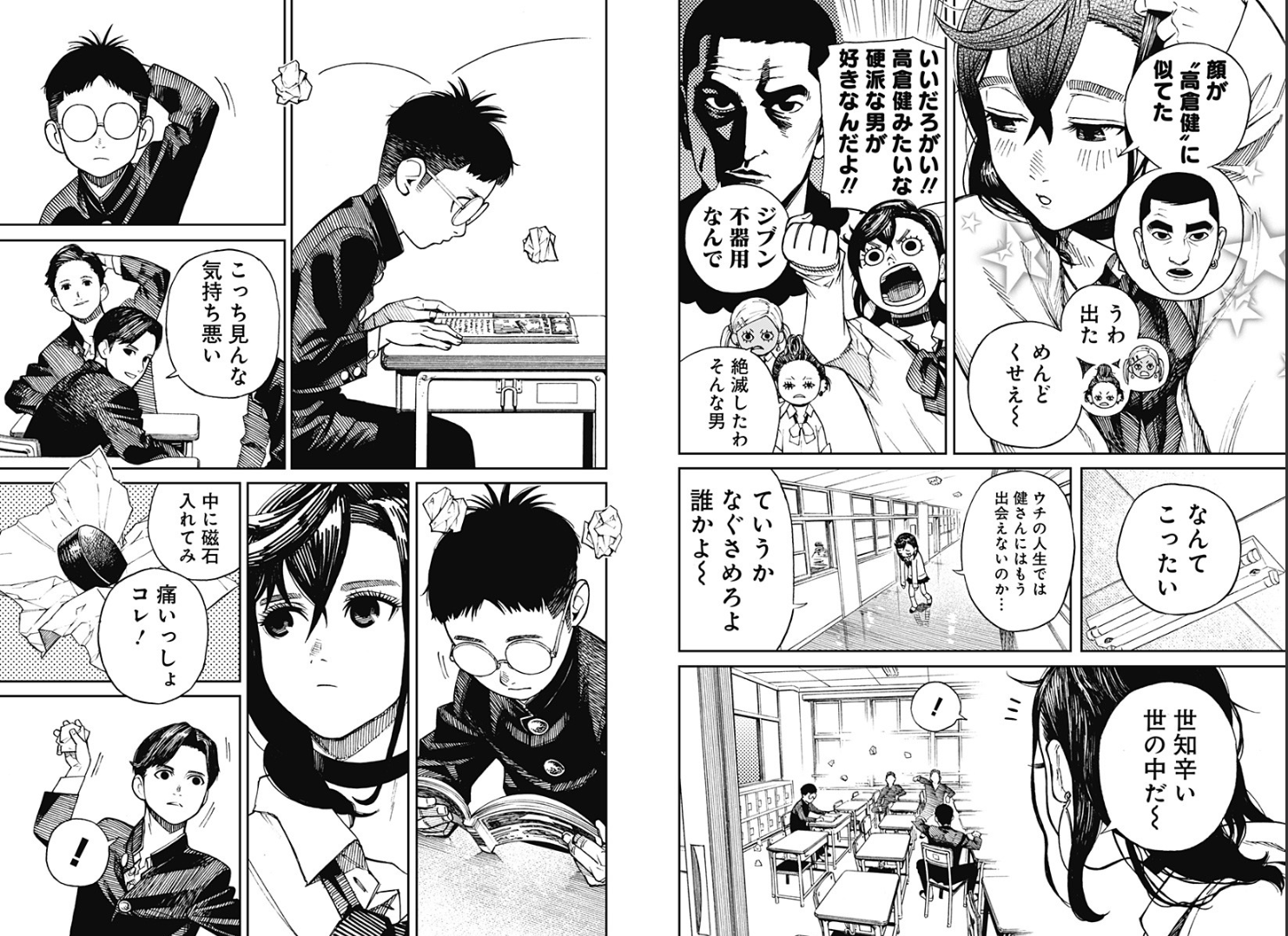Dandadan study
NOTE: All of the pages that I am posting to this site come directly from the shonen jump website! and they are solely the ones that are free! I recieve no money for this, and I am using this material for educational purposes only.
Page 1:

巨弾 オカルティック 怪奇 バトル 巨弾 - きょだん - huge projectile (?) 怪奇 - かいき - bizzare, grotesque, weird 恐怖が / 蠢き 恐怖 - fear, dread, terror 蠢く - うごめく - to wriggle, to squirm 未知に / 戦慄スー・・・ 戦慄 - せんりつ - shiver 戦慄 - わななく - to shiver, to shudder A bunch of other stuff at the bottom of the page... I think that this is just setting the mood and recreating the feel of occult/UFO magazines...
Page 3:
(Page 2 was just a title page)

はあ?
だから〜 / 金貸して / くれねえなら
今日 / デート / 無し
ああ / でも
いい加減 / ヤラして / くれるなら / いいぜ
ラブホ代は / そっちもちで
Notes:
-
だから - This is often used at the beginning of a sentence to say "I told you" or "Like I said," (Source)
-
金貸して(かねかして) - This is a colloquial way of writing 金を貸して. It is common in casual speech to drop the を particle sometimes. 金を貸して is the て form of the verb 金を貸す, meaning to lend money. It may be better to think of this as the verb 貸す with the direct object 金 attached to it. 金 means gold or money, and 貸す means to lend.
-
くれねえ- It seems that we have more casual speech here: くれねえ seems to be a variation on くれない, the negative non-past form of くれる meaning to give. Here we have 〜てくれる which has its own meaning. From what I understand, given a verb X in て form, Xてくれる means that the verb X is being done as a favor for the speaker by somoene else. More information on that is here.
AならB - This is a binary particle that, in this case, expresses "if A then B" (source).
今日デート無し - 今日デート clearly means "Today's date," with date reffering to the romantic outing in this context (Is it really romantic if you're going out with this guy?). From what I've heard, 無し or なし is related to ない, the negation of the existence verb ある. ある→あり, ない→なし. These alternate forms are like nouns(?) and refer to the property of being existent / non-existent respectively. So here, he is saying 「今日、デートは 無しだ」or "today there is no date." I do not fully understand how なし and あり works yet, I'll need to keep an eye out for this again.
If this is correct, then the て form understanding makes sense: "If (you) dont lend/give (me) money, then today there is no date."いい加減 (いいかげん)- sufficent, just right(source).
ヤラす (alt 遣らす) - This verb seems to be related to 遣らせる. While this usually means to allow/ to let (someone) do, in this context it actually means "to do someone"(source).
ぜ - This is an ending particle. From what I read (source), ぜ is usually used in imperative sentences to add more force. It is also mostly used by men. The whole sentence いい加減ヤラしてくれるならいいぜ means something like "If you let me do you sufficiently, then okay (in ref. to the date)" but with the extra macho flavor. Man, this guy sucks!
Note that いい here does not mean "good." Rather, it means something like "okay" (source).ラブホ - abbreviation of ラブホテル, love hotel
代 - cost, fee. In this case, ラブホ代 means "the cost of the love hotel."
そっちもちで - そっち is a 2nd person pronoun, 持ち seems to mean expense, and Xで at the end of a sentence... well, I was told that it means with but I couldnt find a source to back that up. A translation would be "With the love hotel fee being your expense"(source). What a jerk!
here is a link to an article describing the dots where furigana usually are.
page 4:

わぷっ
殴られろ!!
ちよっ / てめっ!
うつ・・・!
調子に / 乗んな / こらあ!!
もういいわ / おめえなんか / よお!!
金も無えし / ヤれもしねえ女 / 興味ねえわ!!
つざけんな / バカ!!タコ!!
イカ!! / マグロ!!
超 / ウケる〜
魚介類は / 悪口じゃ / ねーから〜
なぐさめろ / よ〜
初氏だったん / だぞ〜
だから / やめとけって / 言ったじゃ〜ん
おれのどこが / よかったわけ〜
Notes:
A note on little っ versus big つ: With time and practice I will be able to tell which is which based on context, but until then I've found it helpful to use the columns of text themselves. The big つ take up the entire width of a text column, while the little っ is usually shifted to the rightmost part of its column and does not fill the entire space.
わふっ - This is just an onomatopoeia. If I were almost kicked in the face, I might make a similar noise. This is a great example of not relying solely on dictionaries; when I looked up わふつ I found 和仏, which means Japanese-French (as in 和仏辞典, Japanese-French Dictionary). This is clearly not the meaning of what's written, but an interesting fact still.
殴られろ (なぐられろ) - 殴られる is the passive form of the verb 殴る "to strike, to hit"(resource). Then adding ろ instead of る makes this the imperative passive form (source). she is saying "let me hit you!"
ちょってめっ - Some kind of exclamation, im not sure. One thing I found was 一寸 or ちょっと which can be an exclamation (source). I was told てめっ is a shortened てめえ. This makes contextual sense, as I found sources saying てめえ is a vulgar/insulting second person pronoun(source). Then he is saying something like "hold on, asshole!"
調子 (ちょうし)- mood,manner,style (source).
乗る (のる)- to ride
調子に乗る and こら- This manga is using a lot of colloquial spellings, and this is no exception! I was told that 調子に乗んな comes from 調子に乗る, which is a common phrase meaning "to get carried away" (literally "riding mood") (source). In this case, I think (?) that this is in the negative imperative form. Usually that would be 調子に乗るな, but here it's written as 調子に乗んな.
こら is a common interjection, like "hey!" or "hold up!"(source). Together with 調子に乗るな, Im interpreting this to mean "Hey, dont get carried away!" The only thing that worries me is that こら usually comes before a sentence, whereas here it is at the end of the sentence...もういい - that's enough; I've had enough (source)
おめえ - an alternative form of おまえ, an informal second person pronoun, masculine (source)
X なんか - Informal, way of saying " things/people like X" (source)
もういいわおめえなんかよお!! - One of the few I feel pretty good about! This seems to be pretty straightforward, saying "I've had enough of people like you, you know?!" The only thing I dont understand is what わ is doing here...
page 5:

顔が / ”高倉健”に / 似てた
うわ / 出た
めんど / くぜえ〜
いいだろがい!! / 高倉健みたいな / 硬派な男が / 好きなんだよ!!
ジブン / 下器用 / なんで
絶滅したわ / そんなそんな男
なんて / こったい
ウチの人生では / 健さんにはもう / 出会えないのか・・・
ていうか / なぐさめろよ / だれかよ〜
世知辛い / 世の中だ〜
こっち貝んな / 気持ち悪い
中に磁石 / 入れてみ
磁いっしょ / コレ!







